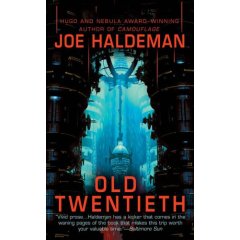Joe Haldeman, Old Twentieth
reviewed by Danielle L. Parker

|
|
Old Twentieth
Author: Joe HaldemanPublisher: Ace, 2005 Hardcover: $24.95 U.S. Length: 257 pages ISBN: 0-441-01285-X |
There are authors who write about war as one gung-ho, testosterone-doped, pubescent high. But for those of us who don’t get into shoot-’em-up now that we’re past our fondness for plastic light-sabers, there is Joe Haldeman. Perhaps his experience in a thoroughly ambiguous war (Mr. Haldeman is a Vietnam veteran) provided him with the raw material he shapes into thqe universal experience of war, on both a physical and metaphysical level. Joe Haldeman writes war stories for grown-ups.
The references to war in Old Twentieth are more oblique than they are in most Haldeman stories. The war is over, in fact, and the survivors are living with the consequences. There doesn’t seem to be much in the way of consequence, other than Happily Ever After, when the story opens. The war to end all wars was apparently a class struggle. The rich bought themselves immortality with the Becker-Cendrek Process. The unwashed masses weren’t so lucky. Lot 92 killed them all off, cities at a time. No one’s left now but those rich genocidal immortals.
Forever must be boring. Maybe death gave life spice. Whatever the reason, those rich immortals can’t stay away from the old twentieth century, in the form of a time-travel simulation created by a sophisticated artificial intelligence. Managing the simulation is Jacob Brewer’s job: he’s the chief virtual reality engineer on a starship headed on a thousand-year voyage to the star Beta Hydrii. Since its crew and passengers don’t die, they can face their long trip with a shrug, so long as they have that time-travel simulation to while away their journey.
But something goes wrong, of course. Immortals begin to die in the time-travel simulation. The artificial intelligence pulls a HAL and starts talking about its need for constant input. Feed me, feed me. Sound familiar? Maybe it’s all too familiar, for many readers, including myself. Still, it’s done with Haldeman’s usual depth of character and subtle, understated prose. As someone once pointed out, all the stories have been told, it’s just how they’re told that matters.
This story isn’t for those of you who like clear-cut endings. To say Old Twentieth ends ambiguously is to put it mildly. Is Jacob Brewer dead or alive? Is anything that the self-confessed, lying-capable A.I. presents to its captive subjects true? Are the deaths just failures in the Becker-Cendrek Process, or is the A. I. a murderer? Who can tell? As a witty reader in one of the Amazon.com reviews noted, at the end he was “scratching [his] chimp-like head” and trying to figure out what really happened.

Joe Haldeman at a reading
of his novel Old Twentieth
Old Twentieth works under two fairly heavy handicaps. The first is that most of it is been-there, done-that, and in speculative fiction, which is at its best idea driven, that’s a particular handicap. The second handicap is that, while the protagonist is fully fleshed and sympathetic, the background scenario (genocide of those unlucky poor) was so much in my mind I had trouble caring about these mostly-conscience-free immortals. If their world tumbles around them because they can’t give up their addictive virtual realities or because their miracle medical cure fails, who cares? They didn’t get as good as they gave. Haldeman’s descriptions of a Portland stinking with the bodies of the dead must have been a little too effective for this reader.
Still, it’s a pleasure to read prose written in such an understated, deceptively simple style. This is certainly not Haldeman at his best, but where he falls short, many other writers could but hope to reach. Check it out!
Copyright © 2006 by Danielle L. Parker

